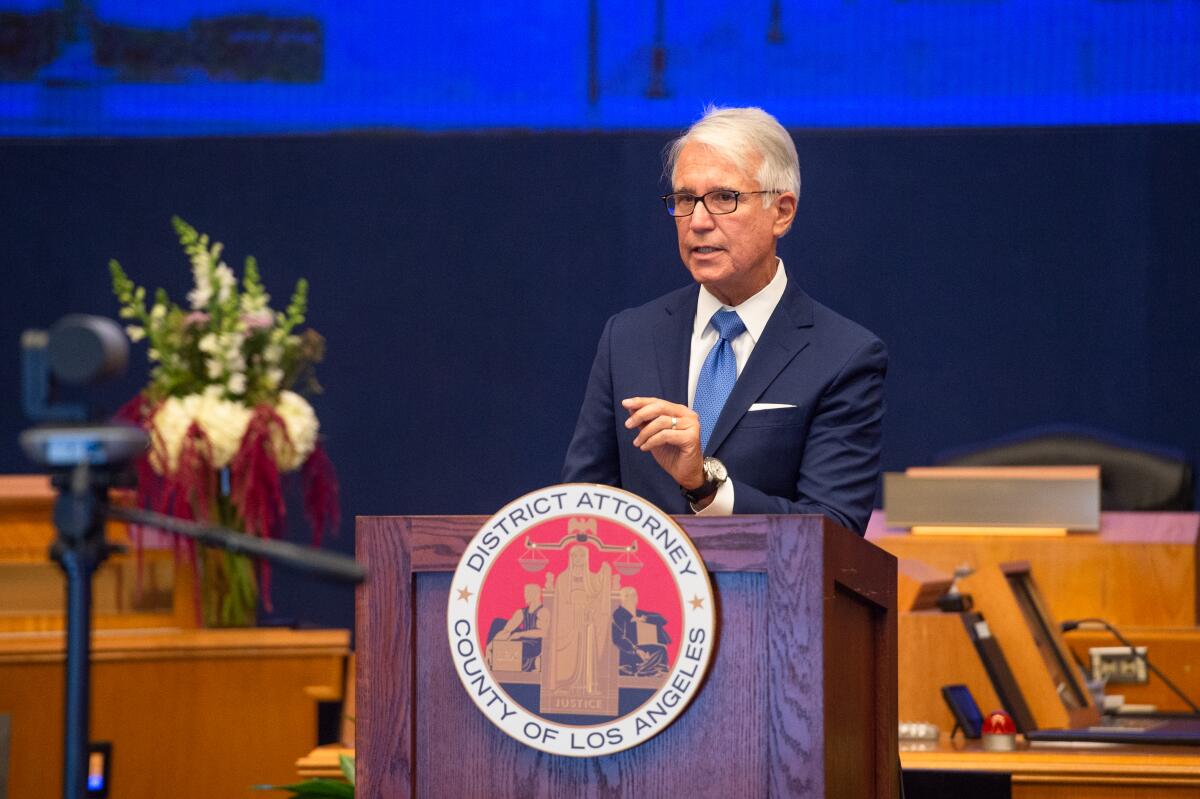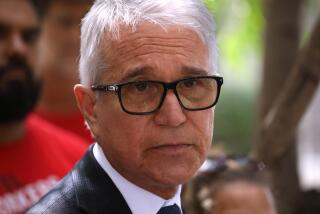Editorial: Archaic ‘tough-on-crime’ holdouts are refusing to let George Gascón do his job

A state Superior Court judge on Monday handed a partial victory to Los Angeles County Dist. Atty. George Gascón’s subordinates, who sought to block him from seeking shorter prison terms for many defendants. In doing so, Judge James Chalfant cited California legislation dating back to the start of the tough-on-crime era nearly half a century ago, including laws that emphasized retribution and eliminated inmates’ incentives to prepare for safe and responsible lives after prison.
But the judge left out a few things. He failed to mention that those excessively punitive policies went hand in hand with a costly prison-building boom and gave new clout to the prison guards union, and that even after adding nearly 30 new prisons, creating a network designed to hold 85,000 inmates, about 165,000 people were stuffed into prisons, leaving no space or money for adequate medical care, mental health treatment or rehabilitation programs. He didn’t mention that a federal judge seized control of the prisons in 2006, or that the state Supreme Court signed off on massive releases to stop ongoing violations of the 8th Amendment protections against cruel and unusual punishment, or that crime continued a precipitous drop after the prisons were depopulated.
Nor did he mention that crime-ravaged communities received, instead of relief and healing, additional waves of cruelty in the form of unnecessarily degrading and violent policing, and the destabilizing consequences of excessive sentences that kept on running long after many offenders were adequately punished.
Nor did he mention that Gov. Arnold Schwarzenegger overhauled the state prison department in 2005, putting “rehabilitation” back into its mission and its name, or that California voters modified the “three strikes” law in 2012, downgraded a number of drug and property crimes to misdemeanor status in 2014 (in a ballot measure co-written by Gascón) and made parole available earlier to some inmates in 2016.
Gascón is attempting to exercise the discretion voters gave him when they elected him in November to curb some of the excesses and inequities that pervade California’s criminal justice system. And in so doing, he’s trying to reduce some of the recurring damage that outsize sentences do, especially to Black and Latino communities that suffer a disproportionate impact of both crime and punishment.
The ruling helps show how far California has yet to go in reforming its criminal justice system in the face of thousands of prosecutors, law enforcement officers and judges who have served their entire careers immersed in the 1970s philosophy that crime survivors are best served when courts hand down the longest possible sentences.
The ruling leaves intact Gascón’s policy not to seek most sentencing add-ons, or “enhancements,” on top of base sentences for newly charged defendants. Instead, Chalfant barred him from dropping enhancement charges from cases brought by his predecessors, while requiring his office to seek the tougher penalties provided for repeat felons under the three-strikes law. These are subjects for appeal, which Gascón plans to pursue. The law, of course, is paramount, but when conflicts arise over its meaning, it must be interpreted to provide maximum discretion to those, like Gascón, whom voters choose to carry it out.
L.A. County voters chose to continue on a path toward reform and away from the policies of the 1970s. Elections mean little if victors are denied the ability to shift direction.
More to Read
A cure for the common opinion
Get thought-provoking perspectives with our weekly newsletter.
You may occasionally receive promotional content from the Los Angeles Times.






